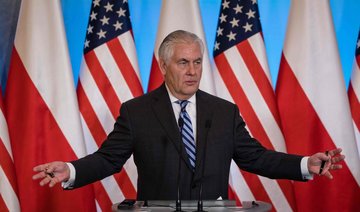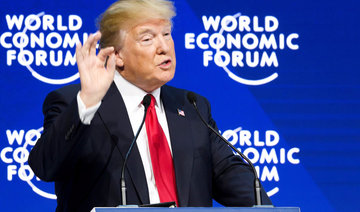WARSAW: As President Donald Trump declared that “America First does not mean America alone” at a global economic forum in Switzerland, his top diplomat was on a European trip of his own, trying to convince skeptical allies that the oft-repeated phrase is more than just lip service.
Yet a year into Trump’s presidency, his administration has demonstrated that “America First” may, indeed, mean “America alone,” though it remains unclear if that has helped Secretary of State Rex Tillerson’s bargaining position on crucial national security and foreign policy matters.
Amid crises in multiple hotspots and before joining Trump at the World Economic Forum in Davos, Tillerson visited London and Paris with a full agenda aimed at defusing not only the issues at hand but also tensions with Washington.
His mission was primarily to secure British and French support for tough new measures against Iran that might prevent the US from withdrawing from the 2015 nuclear accord. Along the way, he also chastised Turkey for attacking US-backed Kurd forces there.
“As the old saying goes, it’s always darkest before the dawn,” Tillerson said while wrapping up his European tour in Warsaw on Saturday. “I don’t want to say we’re at the darkest moment of any of those three areas ... but I think it’s why we have given it so much attention and are working hard with partners and allies to put mechanisms in place to begin the very, very hard work of addressing the concerns in all three.”
Tillerson left London for Paris on Monday cautiously optimistic that progress could be made with the British and the French on crafting a supplemental agreement to the Iran deal that would address what Trump has said are serious flaws. Trump has vowed to pull out if those issues aren’t addressed by spring.
In London, Tillerson announced the formation of working groups that began meeting this week to look at specific points of concern including Iran’s ballistic missile program, sunset provisions that gradually allow Iran to resume some advanced atomic work, Iranian support for Syrian regime, Yemen’s Houthi rebels and Lebanon’s Hezbollah movement.
While Iran will be excluded from those discussions, he said, the working groups would explore “how we might engage the Iranians on discussions to address these issues.”
On Tuesday, French Foreign Minister Jean-Yves Le Drian questioned why the US was focused on securing the side deal only with the three European nations that are individual participants in the nuclear accord — Britain, France and Germany — and not the other parties, China and Russia, or the European Union as a bloc.
It was in Paris, at the inauguration of a new group dedicated to bringing those who use banned chemical weapons to justice, that Tillerson launched his accusations at Russia.
Russian officials responded furiously, insisting that the US was inventing new chemical weapons strikes for the purpose of maligning Russia.
Still, when Tillerson spoke the next day with Russian Foreign Minister Sergey Lavrov, the spat was not mentioned in readouts by either side.
Tillerson aims to sell ‘America First’ to wary allies
Tillerson aims to sell ‘America First’ to wary allies

24 killed as pro-Ankara factions clash with Syria’s Kurdish-led SDF

- The latest bout of fighting was sparked by attacks by the Turkiye-backed fighters on two towns south of Manbij, the Syrian Observatory for Human Rights said
- Swathes of northern Syria are controlled by the US-backed SDF, which spearheaded the fight that helped oust the Daesh group from its last territory in Syria in 2019
BEIRUT: At least 24 fighters, mostly from Turkish-backed groups, were killed in clashes with the Kurdish-led Syrian Democratic Forces (SDF) in the northern Manbij district, a war monitor said on Thursday.
The violence killed 23 Turkish-backed fighters and one member of the SDF-affiliated Manbij Military Council, the Syrian Observatory for Human Rights said.
The Britain-based war monitor said the latest bout of fighting was sparked by attacks by the Ankara-backed fighters on two towns south of Manbij.
Swathes of northern Syria are controlled by a Kurdish-led administration whose de facto army, the US-backed SDF, spearheaded the fight that helped oust the Daesh group from its last territory in Syria in 2019.
Turkiye accuses the main component of the SDF, the People’s Protection Units (YPG), of being affiliated with the militant Kurdistan Workers’ Party (PKK), which both Washington and Ankara blacklist as a terrorist group.
Fighting has raged around the Arab-majority city of Manbij, controlled by the Manbij Military Council, a group of local fighters operating under the SDF.
According to the Observatory, “clashes continued south and east of Manbij, while Turkish forces bombarded the area with drones and heavy artillery.”
The SDF said it repelled attacks by Turkiye-backed groups south and east of Manbij.
“This morning, with the support of five Turkish drones, tanks and modern armored vehicles, the mercenary groups launched violent attacks” on several villages in the Manbij area, the SDF said in a statement.
“Our fighters succeeded in repelling all the attacks, killing dozens of mercenaries and destroying six armored vehicles, including a tank.”
Turkiye has mounted multiple operations against the SDF since 2016, and Ankara-backed groups have captured several Kurdish-held towns in northern Syria in recent weeks.
The fighting has continued since rebels led by Islamist group Hayat Tahrir Al-Sham (HTS) toppled longtime ruler Bashar Assad on December 8.
King Charles donates to International Rescue Committee’s Syria aid operation

- Donation will fund healthcare, protect children, provide emergency cash
LONDON: King Charles III has helped pay for urgent humanitarian aid needed in Syria after the fall of Bashar Assad.
Charles made an undisclosed donation to International Rescue Committee UK to fund healthcare, protect children and provide emergency cash.
The king is the patron of the charity, which says Syria is facing profound humanitarian needs despite the defeat of the Assad regime by opposition forces.
Khusbu Patel, IRC UK’s acting executive director, said: “His Majesty’s contribution underscores his deep commitment to addressing urgent global challenges, and helping people affected by humanitarian crises to survive, recover and rebuild their lives.
“We are immensely grateful to His Majesty The King for his donation supporting our work in Syria. This assistance will enable us to provide essential services, including healthcare, child protection and emergency cash, to those people most in need.”
The charity said it was scaling-up its efforts in northern Syria to evaluate the urgent needs of communities. Towns and villages have become accessible to aid groups for the first time in years now that rebel forces have taken control of much of the country.
The charity said Syria ranks fourth on its emergency watchlist for 2025 and a recent assessment found that people in the northeast of the country were facing unsafe childbirth conditions, cold-related illnesses, water contamination, and shortages of medical supplies.
Charles last month said he would be “praying for Syria” as he attended a church service in London attended by various faiths.
The king met Syrian nun Sister Annie Demerjian at the event, who described the situation in her homeland after the regime had been swept from power.
Israel strikes Syrian army positions near Aleppo: monitor

- Syrian Observatory for Human Rights said the strikes targeted defense and research facilities
BEIRUT: Israel bombed Syrian army positions south of Aleppo on Thursday, the latest such strikes since the overthrow of longtime strongman Bashar Assad, a war monitor and local residents said.
Residents reported hearing huge explosions in the area, while the Syrian Observatory for Human Rights said the strikes targeted defense and research facilities.
The observatory said that “at least seven massive explosions were heard, resulting from an Israeli airstrike on defense factories... south of Aleppo.”
There was no immediate information on whether the strikes caused any casualties.
Syrian state TV also reported about an Israeli strike in Aleppo without providing details.
A resident of the Al-Safira area told AFP on condition of anonymity: “They hit defense factories, five strikes... The strikes were very strong. It made the ground shake, doors and windows opened — the strongest strikes I ever heard... It turned the night into day.”
Since opposition forces overthrew Assad in early December, Israel has conducted hundreds of strikes on Syrian military assets, saying they are aimed at preventing military weapons from falling into hostile hands.
After Ocalan visit, Turkiye opposition MPs brief speaker, far-right leader

ISTANBUL: A delegation from Turkiye’s pro-Kurdish opposition DEM party met Thursday with the parliamentary speaker and far-right MHP leader amid tentative efforts to resume dialogue between Ankara and the banned PKK militant group. DEM’s three-person delegation met with Speaker Numan Kurtulmus and then with MHP leader Devlet Bahceli.
The aim was to brief them on a rare weekend meeting with Abdullah Ocalan, the jailed founder of the Kurdistan Workers’ Party who is serving life without parole on Imrali prison island near Istanbul.
It was the Ocalan’s first political visit in almost a decade and follows an easing of tension between Ankara and the PKK, which has waged a decades-long insurgency on Turkish soil and is proscribed by Washington and Brussels as a terror group.
The visit took place two months after Bahceli extended a surprise olive branch to Ocalan, inviting him to parliament to disband the PKK and saying he should be given the “right to hope” in remarks understood to moot a possible early release.
Backed by President Recep Tayyip Erdogan, the tentative opening came a month before Syrian rebels began a lightning 12-day offensive that ousted Bashar Assad in a move which has forced Turkiye’s concerns about the Kurdish issue into the headlines.
During Saturday’s meeting with DEM lawmakers Sirri Sureyya Onder and Pervin Buldan, Ocalan said he had “the competence and determination to make a positive contribution to the new paradigm started by Mr.Bahceli and Mr.Erdogan.”
Onder and Buldan then “began a round of meetings with the parliamentary parties” and were joined on Thursday by Ahmet Turk, 82, a veteran Kurdish politician with a long history of involvement in efforts to resolve the Kurdish issue.
Iraq’s Sulaimaniyah city bans groups accused of PKK links

SULAIMANIYAH: Authorities in the Iraqi Kurdish city of Sulaimaniyah have banned four organizations accused of affiliation with the Turkish-blacklisted Kurdistan Workers Party, activists said Thursday, denouncing the move as “political.”
The four organizations include two feminist groups and a media production house, according to the METRO center for press freedoms which organized a news conference in Sulaimaniyah to criticize the decision.
PKK fighters have several positions in Iraq’s northern autonomous Kurdistan region, which also hosts Turkish military bases used to strike Kurdish insurgents.
Ankara and Washington both deem the PKK, which has waged a decades-long insurgency in Turkiye, a terrorist organization.
Authorities in Sulaimaniyah, the Iraqi Kurdistan region’s second city, have been accused of leniency toward PKK activities.
But the Iraqi federal authorities in Baghdad have recently sharpened their tone against the Turkish Kurdish insurgents.
Col. Salam Abdel Khaleq, the spokesman for the Kurdish Asayesh security forces in Sulaimaniyah, told AFP that the bans came “after a decision from the Iraqi judiciary and as a result of the expiration of the licenses” of these groups.



















